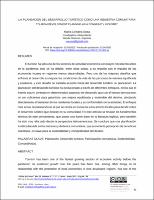La planeación del desarrollo turístico como una industria comunitaria
Tourism development planning as a community industry
Abstract
El turismo ha sido uno de los sectores de actividad económica con mayor crecimiento antes de la pandemia; esto se ha debido, entre otras cosas, a su relación con el impulso de las economías locales en regiones menos desarrolladas. Pero uno de los mayores desafíos que enfrenta el desarrollo es mejorar las condiciones de vida de las personas de manera equilibrada y equitativa, y este desafío se traslada al punto inicial del desarrollo turístico: su planeación. La planeación del desarrollo turístico ha evolucionado a través de diferentes enfoques, en los que el interés estuvo centrado en determinados aspectos del desarrollo que con el tiempo demostraron no ser suficientes para garantizar una mejora equilibrada y sostenible del destino, afectando directamente el bienestar de los residentes locales y su conformidad con la actividad. El enfoque más actual de planeación es el que se centra en involucrar a los actores locales para decidir sobre el desarrollo turístico que desean en su comunidad. En este artículo se revisan los fundamentos teóricos de este pensamiento, que posee una fuerte base en la literatura inglesa, pero también ha sido muy reforzado desde la perspectiva latinoamericana. Se concluye que una planificación turística basada en los intereses y dinámica comunitaria, que aumente la percepción de beneficios colectivos, es clave para la sostenibilidad y competitividad del destino. Tourism has been one of the fastest growing sectors of economic activity before the pandemic; its sustained growth over the years has been due, among other things, to its relationship with the promotion of local economies in less developed regions. But one of the biggest challenges facing development is to improve people's living conditions in a balanced and equitable manner, and this challenge is transferred to the starting point of tourism development: its planning. Tourism development planning has evolved through different approaches, in which interest was focused on certain aspects of development that over time proved not to be sufficient to guarantee a balanced and sustainable improvement of the destination, directly affecting the well-being of local residents and their compliance with the activity. The most current approach to planning is the one that focuses on involving local actors to decide on the tourism development they want in their community. This article reviews the theoretical foundations of this thought, which has a strong base in English literature, but has also been greatly reinforced from the Latin American perspective. It is concluded that tourism planning based on interests and community dynamic, which increases the perception of collective benefits, is key to the sustainability and competitiveness of the tourist destination.
Collections
- Revista Visión de Futuro [502]
The following license files are associated with this item:



